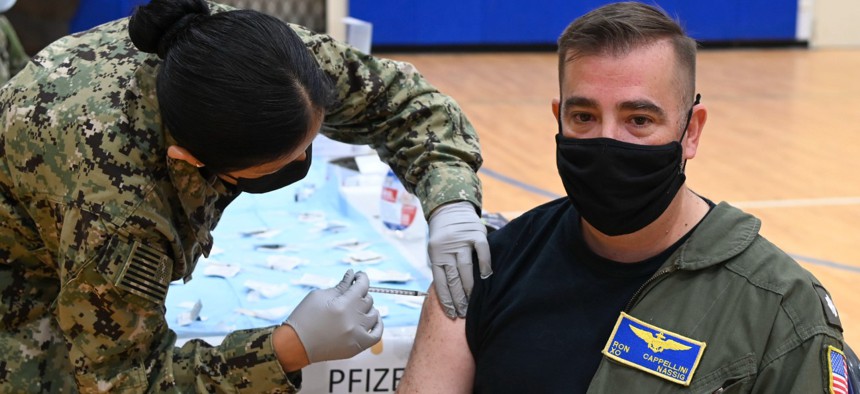
Cmdr. Ronald Cappellini, Naval Air Station Sigonella executive officer, receives his COVID-19 vaccine booster from Lt. j.g. Aracely Duerkop, during a mass-immunization exercise on Naval Air Station Sigonella on Dec. 7. Mass Communication Specialist 2nd Class Josh Coté / U.S. Navy
Coronavirus Roundup: Where the Biden Administration’s Vaccine Mandates Stand; Possible Mandatory Booster Shots for the Military
There's a lot to keep track of. Here’s today’s list of news updates and stories you may have missed.
The White House released on Friday its latest regulatory plan, which shows its goals for the upcoming months.
“This administration is using every lever at its disposal—including regulatory action—to deliver on the president’s priorities, including containing the pandemic, driving a durable economic recovery, advancing equity and combating climate change,” said Sharon Block, associate administrator of the Office of Information and Regulatory Affairs. “This agenda is fully consistent with the priorities outlined by the president as reflected in his executive orders and our previous regulatory agenda.” Here are some of the other recent headlines you might have missed.
White House Press Secretary Jen Psaki was asked during the briefing on Monday if the federal government can be doing more to get people to get their booster shots. “That is absolutely what we're focused on. And we've seen an uptick recently,” she replied. “But we are continuing to press—publicly, privately with governors, as you've seen us talk a lot about this nationally—because we know that the more people who get boosted, the more are protected.”
The Equal Employment Opportunity Commission posted new guidance on Tuesday to clarify when COVID-19 is considered a disability. The Justice and Health and Human Services departments issued guidance in July, which “focuses solely on long COVID,” said the EEOC. “This new EEOC technical assistance focuses more broadly on COVID-19 and does so in the context of Title I of the [Americans With Disabilities Act] and Section 501 of the Rehabilitation Act, which cover employment.”
The Pandemic Response Accountability Committee and National Academy of Public Administration are hosting an event on Wednesday afternoon titled “Did Pandemic Response Funding Help Americans Connect in a Crisis?”
DCist looked at how the federal government’s embrace of long-term telework could impact Washington, D.C.’s economy. “If every federal worker spends an average of $20 a day downtown, the deputy mayor says, ‘somewhere between $60 and $100 million of tax revenue has vanished if those workers don’t come back,’” said the report published last week. “But pleas from business owners and the D.C. government haven’t produced an about-face by the numerous federal agencies that continue to allow maximum telework for most of their D.C.-area employees. Many agencies are still finalizing official return-to-work plans with union leaders, says Jacque Simon with [the American Federation of Government Employees], and their plans are all over the map, even among offices within a single agency.”
The State Department is waiving in person appearance requirements for certain repeat immigrant visa applicants, which will last for 24 months. “As the [temporary final rule] is designed to help address the problem of applicants who are unable to travel due to the COVID-19 pandemic and who must meet specific time-limited criteria, this [rule] will no longer be necessary as the pandemic becomes less acute and ordinary travel resumes,” said a notice published in the Federal Register on Monday. “The department believes that 24 months is sufficient to process the cases described.”
There are “active discussions” about whether or not booster shots will be required for the military, Pentagon Press Secretary John Kirby said on Friday.
The Air Force has discharged 27 airmen for not getting vaccinated, who were some of the first active duty service members to get removed for noncompliance with the vaccine mandate, The Wall Street Journal reported on Monday. “In all, roughly 97% of the active-duty members of the Air Force and Space Force are fully vaccinated,” said the report.
WebMD has a roundup of where the Biden administration’s vaccine mandates and rules currently stand. All have some type of pause except for the one for civilian federal employees and the military.
In a recent report the National Credit Union Administration’s watchdog looked at the agency’s work posture during the pandemic from January 2020 to September 2021. “We determined that the NCUA took actions designed to protect the health and safety of staff in response to COVID-19,” said the IG office. “Although we found minor weaknesses in some internal controls related to the agency’s onsite approval and health self-certification processes, management changed these processes during our audit and no longer follows the processes we originally reviewed.”
Upcoming: White House Press Secretary Jen Psaki will give a briefing at 2 p.m.
Help us understand the situation better. Are you a federal employee, contractor or military member with information, concerns, etc. about how your agency is handling the coronavirus? Email us at newstips@govexec.com.







